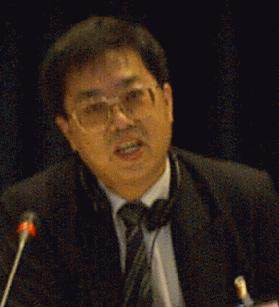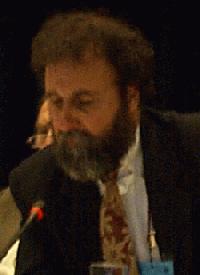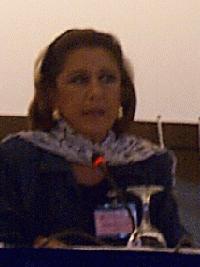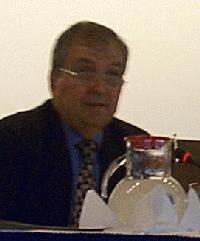Published by the International Institute for Sustainable Development
(IISD)
Vol. 12 No. 78
Wednesday, June 03 1998
HIGHLIGHTS FROM THE MEETINGS OF THE FCCC SUBSIDIARY BODIES
2 JUNE 1998
Delegates to the Subsidiary Body for Implementation (SBI) and the Subsidiary Body for
Scientific and Technical Advice (SBSTA) held opening sessions in the morning. In the
afternoon, SBI and SBSTA met in a joint Plenary session to consider mechanisms for
cooperative implementation of the Protocol.
SUBSIDIARY BODY FOR IMPLEMENTATION
 Chair
Bakary Kante (Senegal) opened the first meeting of the SBI. Michael Zammit Cutajar,
FCCC Executive Secretary, noted 37 countries have signed the Kyoto Protocol, including
Parties representing 39% of Annex I CO2 emissions. Chair
Bakary Kante (Senegal) opened the first meeting of the SBI. Michael Zammit Cutajar,
FCCC Executive Secretary, noted 37 countries have signed the Kyoto Protocol, including
Parties representing 39% of Annex I CO2 emissions.
The G-77/CHINA called on delegates not to be distracted from the COP's principal task
of implementing the Convention. He recalled a Convention article on a second review of
Annex I Party commitments by December 1998. He also stressed decisions on new and
additional financial resources and inadequate implementation of previous COP decisions on
technology transfer.
On adoption of the agenda, SAUDI ARABIA proposed including "preparatory work under
the related provisions of Articles 2.3 and 3.14 of the Kyoto Protocol" in an item on
technology transfer. He said a decision at COP-3 on these paragraphs, on adverse impacts,
was taken as part of a compromise package. The US expressed concern that the amendment
could be prejudicial to the Protocol's wording, because paragraph 2.3 states that the COP
serving as the Meeting of the Parties (MOP) "may take further action" and does
not "require" further action to promote implementation of the paragraph's
provisions. Delegates agreed to amend the agenda item, adding a bracketed reference to
decision 3/CP.3 (adverse impacts) and Protocol Articles 2.3 and 3.14.
The Chair announced Iran's nomination as SBI Vice Chair for Asia. He urged joint
SBI-SBSTA draft decisions on work allocation and preparations for a work program for the
Conference of the Parties/Meeting of the Parties (COP/MOP-1).
On national communications, delegates discussed three scheduling options for future
Annex I Party communications and their review. Many Annex I Parties favored: lengthening
the period between submissions of national communications; interim electronic reports; and
synchronized reporting. Many favored 2001 for the next communication, but SWITZERLAND said
information on achievement of stabilization by 2000 could not be provided until 2002. The
US called for less emphasis on details of domestic actions or national circumstances and
for more time for data collection on emissions trading and CDM projects. The EU, with NEW
ZEALAND, favored a fourth national communication deadline of 2005 and a strengthened
reporting process leading to the period 2008-2012. CHINA, with the US, noted COP decisions
urging Annex II Parties to include measures taken for technology transfer. The CHAIR
invited Parties to submit nominations for a roster of experts for the in-depth review of
Annex I Parties' second national communications.
SUBSIDIARY BODY FOR SCIENTIFIC AND TECHNICAL ADVICE
 Chair
Kok Kee Chow (Malaysia) said SBSTA's primary aim is to identify common ground and
delegates must make best use of the scheduled time. The G-77/CHINA underscored the
importance of the Protocol's entry into force as soon as possible and cautioned against
distractions from this point. He expressed "extreme" disappointment at the low
targets agreed in Kyoto. Supported by SAUDI ARABIA, IRAN and VENEZUELA, he requested an
additional item on methodological issues related to Articles 4.8 and 4.9 (minimizing
adverse impacts of response measures). Delegates debated this proposal at length, and
agreed to include an item on "referrals from SBI." Chair
Kok Kee Chow (Malaysia) said SBSTA's primary aim is to identify common ground and
delegates must make best use of the scheduled time. The G-77/CHINA underscored the
importance of the Protocol's entry into force as soon as possible and cautioned against
distractions from this point. He expressed "extreme" disappointment at the low
targets agreed in Kyoto. Supported by SAUDI ARABIA, IRAN and VENEZUELA, he requested an
additional item on methodological issues related to Articles 4.8 and 4.9 (minimizing
adverse impacts of response measures). Delegates debated this proposal at length, and
agreed to include an item on "referrals from SBI."
On cooperation with relevant international organizations,  IPCC
Chair Dr. Robert Watson (right) said the IPCC will produce technical reports to assist
the operationalization of the Protocol on: emission scenarios, which will review the
literature and formulate a new set of scenarios; methodological and technological issues
in technology transfer; and one on aviation and the global atmosphere, which assesses the
relevant atmospheric science, aviation technology and socio-economic issues. The Third
Assessment Report will place climate change in a broader evolving social context. IPCC
Chair Dr. Robert Watson (right) said the IPCC will produce technical reports to assist
the operationalization of the Protocol on: emission scenarios, which will review the
literature and formulate a new set of scenarios; methodological and technological issues
in technology transfer; and one on aviation and the global atmosphere, which assesses the
relevant atmospheric science, aviation technology and socio-economic issues. The Third
Assessment Report will place climate change in a broader evolving social context.
Dr. Thomas Spence of the Global Climate Observatory Systems (GCOS) said that a third
draft of the work report covering the status of current systems and recommendations, and
fundamental observations on short- and long-term variability, will soon be available. He
noted that systems currently in use are usually not set up for climate purposes, resulting
in some inconsistencies in data collected.
Dr. Will Stephen of the International Geosphere and Biosphere Programme (IGBP) said his
organization's research provides a broad scientific context against which to judge
proposed actions under the Protocol. He said that consideration should be given to issues
such as the saturation of carbon sinks when negotiating.
PLENARY
 Maria Julia Alsogaray
(left), Secretary of Natural Resources and Sustainable Development of Argentina,
characterized COP-3 in Kyoto as a dynamic step toward meeting the FCCC's goals and said
COP-4 in Buenos Aires should be another step in the same direction. She noted the great
interest in the Clean Development Mechanism (CDM) and emissions trading, but highlighted
the need to address the FCCC as a whole. She urged delegates to develop the elements
common to all flexibility mechanisms together. (Statement available
in RealAudio) Maria Julia Alsogaray
(left), Secretary of Natural Resources and Sustainable Development of Argentina,
characterized COP-3 in Kyoto as a dynamic step toward meeting the FCCC's goals and said
COP-4 in Buenos Aires should be another step in the same direction. She noted the great
interest in the Clean Development Mechanism (CDM) and emissions trading, but highlighted
the need to address the FCCC as a whole. She urged delegates to develop the elements
common to all flexibility mechanisms together. (Statement available
in RealAudio)
UNEP Executive Director  Klaus
Töpfer (right) pointed to the connection between flexibility and minimizing
repercussions for economic growth potential. He underlined UNGASS's call for improved
scientific knowledge on the linkage between environmental conventions, policy coherence
and public awareness. He expressed the hope that his task force could support conventions
and work on linkages with a view to making the best use of institutions and capacity
development. (Statement
available in RealAudio) Klaus
Töpfer (right) pointed to the connection between flexibility and minimizing
repercussions for economic growth potential. He underlined UNGASS's call for improved
scientific knowledge on the linkage between environmental conventions, policy coherence
and public awareness. He expressed the hope that his task force could support conventions
and work on linkages with a view to making the best use of institutions and capacity
development. (Statement
available in RealAudio)
FCCC Executive
Director  Michael Zammit Cutajar (below, left) said he had suggested that the
Bureau consider inviting UNEP to offer help on specific issues with linkages to other
processes. He spoke of an explosion of activities seeking to contribute to the design of
the three new mechanisms envisaged in the Protocol. The Secretariat had just convened a
meeting of expert and interested organizations to contribute to discussion on the
mechanisms, to promote information exchange on plans and resources available for
implementation. The sooner Parties set the basic rules, the sooner economic and
institutional actors could adjust their plans. He drew attention to the Secretariat's
document raising important questions for Parties regarding the new mechanisms and sought
further guidance from the Subsidiary Bodies on future Secretariat activities relating to
the new mechanisms. (Statement available in
RealAudio) Michael Zammit Cutajar (below, left) said he had suggested that the
Bureau consider inviting UNEP to offer help on specific issues with linkages to other
processes. He spoke of an explosion of activities seeking to contribute to the design of
the three new mechanisms envisaged in the Protocol. The Secretariat had just convened a
meeting of expert and interested organizations to contribute to discussion on the
mechanisms, to promote information exchange on plans and resources available for
implementation. The sooner Parties set the basic rules, the sooner economic and
institutional actors could adjust their plans. He drew attention to the Secretariat's
document raising important questions for Parties regarding the new mechanisms and sought
further guidance from the Subsidiary Bodies on future Secretariat activities relating to
the new mechanisms. (Statement available in
RealAudio)
MAURITANIA sought clarification regarding suggestions for a UNEP role. The Executive
Secretary responded that the suggestion was to strengthen the role of UNEP's activities,
which could not be implemented without the approval of the Governing Council. The
PHILIPPINES noted that the activities of other intergovernmental agencies increases
confusion between AIJ and the Clean Development Mechanism (CDM) and said the COP is the
only body mandated to undertake activities under the FCCC.
Regarding flexibility mechanisms, SBI Chair Kante recalled that the CDM, emissions
trading and joint implementation are new to the agenda of the subsidiary bodies as a
result of COP-3. This joint meeting was designed to identify preparatory work needed for
COP-4 and reach agreement on a work schedule. Delegates could also decide on future work
to be undertaken on AIJ.
The Chair recommended that delegates address the flexibility mechanisms jointly in
their statements. While each has specific characteristics, they are concerned with
cooperation among Parties. Key issues to address include identifying questions that can be
resolved by COP-4, and essential areas of work on each mechanism, such as methodological
issues.
The Secretariat introduced: Mechanisms for cooperative implementation (FCCC/SB/1998/1);
Submissions by intergovernmental and non-governmental organizations (FCCC/SB/1998/Misc.2);
Submissions from Parties on preparatory work needed for COP-4 (FCCC/SB/1998/Misc.1); and
Update on activities implemented jointly (FCCC/SBSTA/1998/Inf.3).
The G-77/CHINA said the joint cooperation mechanisms bring about technical, political
and other new uncertainties that must be settled. He expressed alarm at interpretations of
the CDM as a cleaner production mechanism or a global carbon fund. He opposed having any
entity outside the FCCC operate the CDM (Statement available
in RealAudio). MAURITANIA said that it may be helpful to address the mechanisms for
implementation of the Protocol separately to avoid blurring the delegates' capacity and
making the Secretariat's work difficult.
The EU stressed that Parties must start with domestic action and said flexibility
mechanisms, which must be cost effective and verifiable, should not create loopholes that
weaken the commitments to be made at COP-4. On emissions trading, he said the adoption and
ratification of a compliance regime is a prerequisite, as is careful consideration of
risk-sharing between buyers and sellers. He noted the need to agree on: what contribution
CDM can make to Annex I QELROs; the operational entities of CDM; and the form and identity
of the various institutions established under Article 12. He emphasized that this Article
does not refer to removals by sinks and suggested that CDM should not apply to sinks
unless the COP/MOP decides otherwise.
The US favored a simple set of rules for emissions trading and specified, inter alia,
that no formal trading should occur until the Protocol enters into force. A Party should
not be able to sell once it has emitted its allowed amounts during any period, i.e.
"deficit trading." He opposed limiting the percentages that can be sold. He
stressed it was premature to limit the extent to which CDM activities may account for
emissions limitation and cautioned against the chilling effect of administrative
restrictions. He said that projects begun under AIJ that lead to legitimate emissions
reductions should receive credits.
INDIA opposed any hierarchy or prioritization of work with regard to the three
collaborative mechanisms. Supported by SAUDI ARABIA, he noted that whereas the AIJ pilot
phase originated as a cost effective mechanism for developed countries, the CDM's origins
are in sustainable development through development cooperation and resource transfer. He
opposed any appropriation of environmental space on the basis of current occupation or
historical emissions. SAUDI ARABIA called for completion of the AIJ pilot phase before
evaluation of the processes, and for full SBSTA elaboration of the technical aspects of
the mechanisms rather than rushed decision-making at COP-4. HUNGARY noted that the soft
commitments of 1992 will expire in 2000 and called for elaboration of new commitments
undertaken in Kyoto by COP-4. He favored addressing the mechanisms separately, and
undertaking work on JI and CDM as well as AIJ, in order to investigate how an emissions
trading network can function.
On the uncertainties surrounding the new mechanisms, the ALLIANCE OF SMALL ISLAND
DEVELOPING STATES (AOSIS) called for a non-compliance regime and noted their supplementary
role. He noted the importance AOSIS attaches to adaptation. JAPAN called on SBI and SBSTA
to elaborate the CDM and asked SBSTA and the IPCC to define sinks and measurements. He
proposed a SBSTA contact group on technical measures.
The MARSHALL ISLANDS cautioned that some organizations may be getting ahead of the
intergovernmental process. CANADA said any advisory role for UNEP would be at the behest
of the FCCC Parties and UNEP's Governing Council. He proposed a contact group to look at
emissions trading, including rules, guidelines and modalities. He proposed separate groups
to look at joint implementation and the CDM, and sinks. NEW ZEALAND called for early
decisions on transparent emissions trading to harness economic efficiency to the
achievement of environmental goals, backed by a firm compliance regime. He objected to a
proposal for ceilings on amounts traded. UGANDA called for an advisory technical panel.
ZIMBABWE did not anticipate a final resolution of issues surrounding flexibility
mechanisms at COP-4.
THINGS TO LOOK FOR
PLENARY: Plenary meet at 10:00 am in the Maritim.
SBI: SBI is expected to meet in the Maritim Room at 3:00 pm.
SBSTA: SBSTA is expected to meet in the Beethoven Room at 3:00 pm.
|

 Chair
Bakary Kante
Chair
Bakary Kante Chair
Kok Kee Chow
Chair
Kok Kee Chow IPCC
Chair Dr. Robert Watson
IPCC
Chair Dr. Robert Watson Maria Julia Alsogaray
Maria Julia Alsogaray Klaus
Töpfer
Klaus
Töpfer Michael Zammit Cutajar
Michael Zammit Cutajar